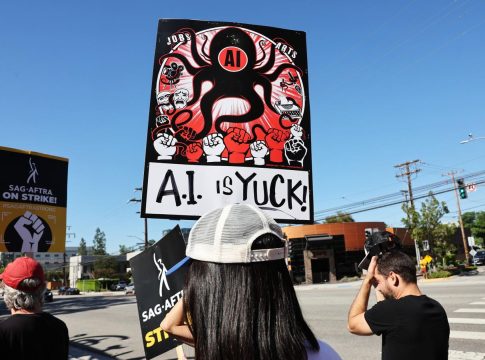Tensions Rise: The Clash of AI and Copyright in Hollywood
A New Chapter in Legal Warfare
In a significant escalation of the ongoing discourse between creative industries and artificial intelligence, Disney and Universal have formally challenged AI image generator Midjourney in a groundbreaking copyright lawsuit. This legal battle mirrors a growing frustration in the entertainment world regarding copyright infringement tied to AI technologies. Meanwhile, over in London, Getty Images has launched a similar suit against Stability AI, marking a pivotal moment for intellectual property rights in the digital age.
The Heart of the Matter: Copyright Infringement Claims
Disney and Universal’s 110-page complaint filed in Los Angeles federal court accuses Midjourney of persistent and willful copyright violation. The studios allege that Midjourney illicitly trained its AI model using vast amounts of copyrighted content— enabling users to create unauthorized images of iconic characters with just a few words. Side-by-side comparisons showcased in the lawsuit illustrate the striking similarities between original movie stills and AI-generated images, heightening concerns about the implications for creativity and ownership.
The Stakes for Artists and Creators
Horacio Gutierrez, Disney’s Chief Legal Officer, emphasized that "piracy remains piracy" regardless of the source. This sentiment underscores a wider industry concern: the potential dilution of intellectual property protections that have historically incentivized artistic innovation. NBCUniversal’s General Counsel Kim Harris reflected this view, stressing the importance of safeguarding creators’ investments, both financial and artistic.
Legal Precedents and Future Implications
As legal experts gear up to dissect this case, a crucial question lingers: Are Midjourney’s outputs transformative enough to sidestep infringement claims? This issue revolves around whether utilizing scraped content without permission constitutes a legal misstep. If the court sides against Midjourney, it could dramatically reshape the landscape for how AI models are trained, possibly setting a precedent that reverberates throughout the industry.
Global Concerns: Getty Images vs. Stability AI
Meanwhile, Getty Images has initiated its own legal battle against Stability AI, accusing the company of using millions of copyrighted images for training its AI, Stable Diffusion. Getty’s CEO, Craig Peters, highlighted the significant financial commitments involved in litigation, alleging that unauthorized scraping constitutes theft—despite AI companies arguing that their models merely engage in "fair use."
Stability AI contends that its practices comply with the principles of fair use, asserting that the output generated does not directly replicate original works. This back-and-forth illuminates the ongoing struggle to balance innovation with ethical and legal constraints.
Emerging Solutions: A Moving Target
The rise of AI has spurred the creation of innovative solutions. For example, Asteria Studios is focusing on AI tools developed exclusively with licensed content, while companies like Moonvalley are navigating compliance challenges by ensuring their training datasets are fully authorized. This trend suggests a future where consent is paramount—both for AI companies and the artists whose works shape the digital world.
Conclusion: The Road Ahead
As the lawsuits unfold, the outcome may define not just the relationship between AI technology and copyright law, but also the broader narrative surrounding creativity in the digital age. The next few months will be critical in determining how AI companies operate and the ethical boundaries they must navigate. What’s at stake is more than just financial restitution—it’s about preserving the foundations of creativity in a rapidly evolving technological landscape.

Writes about personal finance, side hustles, gadgets, and tech innovation.
Bio: Priya specializes in making complex financial and tech topics easy to digest, with experience in fintech and consumer reviews.

